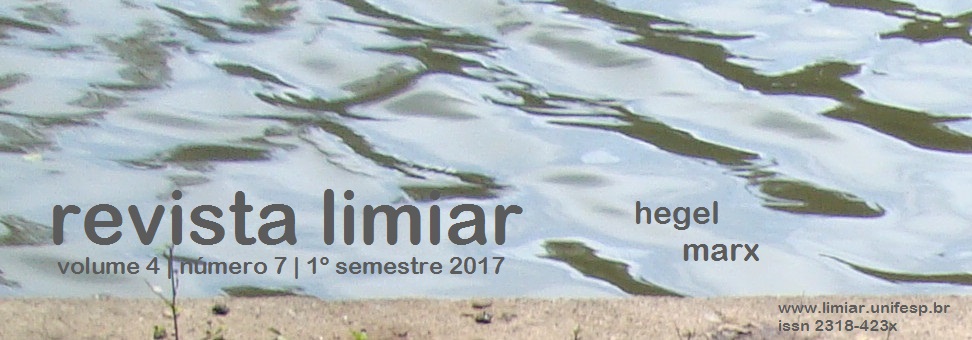Hegel, Marx e a lógica antinômica das relações sociais
DOI:
https://doi.org/10.34024/limiar.2017.v4.9216Palavras-chave:
Marx, Hegel, Dialética, Capitalismo, Teoria socialResumo
O intuito do presente artigo consiste em revisitar a relação entre Marx e Hegel quanto à relação entre dialética e política. Evitaremos avaliar a crítica marxiana como bem-sucedida ou mal-sucedida em sua crítica da dialética hegeliana. No lugar disso, visamos um ponto de encontro entre ambos autores. Destarte, importa primeiramente desmistificar alguns elementos da investigação exegética destes autores. Após isso, daremos atenção aos aspectos que suscitam uma aproximação maior entre Hegel e Marx apresentando argumentos de comentadores que consideramos essenciais para uma tal empreitada. Finalmente, analisaremos algumas categorias da superfície do sistema capitalista e como se dá a análise crítico-dialética de Marx das mesmas, de modo a comprovar o ponto nodal de nossa aproximação de ambos autores, a saber, na tese fundamental da presença de uma normatividade antitética que permeia as relações sociais e que permite vislumbrar o eixo sobre o qual as transformações históricas são possíveis.
Referências
ANDERSON, Kevin. “On Hegel and the Rise of Social Theory: a critical appreciation of Herbert Marcuse’s Reason and Revolution fifty years later”. Sociological Theory. 11:3 (Nov. 1993).
ARNDT, Andreas. “Hegel, Marx and Freedom”. Revista Opinião Filosófica, Porto Alegre, v. 07, nº 01, 2016.
BRANDOM, Robert. Tales of the Mighty Dead: Historical Essays in the Metphysics of Intentionality. Cambridge: Harvard University Press, 2002.
BEISER, Friedrich. Hegel. New York: Routledge, 2005.
BLOCH, Ernst. Subjekt-Objekt: Erläuterungen zur Hegel. Frankfrut: Suhrkamp, 1949.
BOBBIO, Norberto. Nem com Marx, nem contra Marx. Tradução Marco Aurélio Nogueira. Organização Carlo Violi. São Paulo: Editora UNESP, 2006.
BUCHWALTER, A. ‘Hegel, Marx, and the Concept of Immanent Critique’. Journal of the History of Philosophy. Vol. 29, N. 2, April 1991.
DE BOER, Karin. Hegel – the sway of the negative. Basingstoke: Palgrave Macmillan, 2010.
EASTON, Loyd D. “Alienation and Empiricism in Marx’s thought”. Social Research, vo. 37, n. 3 (autumn 1970).
FINDLAY, J.N. Hegel a Re-examination. New York: The MacMillan Company, 1958.
FINESCHI, Roberto. “The Four Levels of Abstraction of Marx’s Concept of ‘Capital’. Or. Can We Consider the Grundrisse the Most Advanced Version of Marx’s Theory of Capital?”, in:
BELLOFIORE, Riccardo; STAROSTA, Guido; THOMAS, Peter D. (orgs.) In Marx’s Laboratory. Critical Interpretations of the Grundrisse. Boston: Brill, 2013.
FULDA, H.F. “These zur Dialektik als Darstellungsmethode (im “Kapital” von Marx), in:
BEYER, W.R. (hrsg), Hegel-Jahrbuch 1974, Köln: 1975.
GRIER, Philip T.. Abstract and Concrete on Hegel´s Logic. In: Essays on Hegel's Logic. George di Giovanni (org.). Albany: State Univ. Of New York, 1990.
HARRIS, Errol E.. A Reply to Philip Grier. in: Essays on Hegel's Logic. George di Giovanni (org.). Albany: State Univ. Of New York, 1990.
HARTMANN, Klaus. “Hegel: a non-metaphysical view”, in: STERN, Robert (ed). G.W.F.Hegel - Critical Assessments, Vol. III – Hegel's Phenomenology of Spirit and Logic. London & New York: Routledge, Taylor & Francis Group, 1993.
HEGEL, G.W.F. Aesthetics. Lectures on Fine Art. Vol. 1. Trans. T.M. Knox. Oxford: Clarendon Press, 1988
____________. Enciclopédia das ciências filosóficas. Trad. Paulo Meneses. São Paulo: Loyola, 1995.
HOULGATE, Stephan. The Opening of Hegel’s Logic: From Being to Infinity. West Lafyette: Purdue University Press, 2006.
LUKÁCS, Georg. History and Class Consciousness. Cambridge: MIT Press, 1971.
MARCUSE, Herbert. Reason and Revolution: Hegel and the Rise of Social Theory. New York: Oxford University Press, 1941.
MARX, Karl. O Capital – crítica da economia política. Tradução Regis Barbosa e Flávio R. Kothe - 3ª ed. - São Paulo: Nova Cultural, 1988 (Coleção Os economistas).
___________. Grundrisse – Foundations of the Critique of Political Economy. Translated with a Foreword by Martin Nicolaus. London: Penguin Books, 1993.
McDOWELL, John. Having the World in View. Essays on Kant, Hegel, and Sellars. Cambridge: Harvard University Press, 2009.
McTAGGART, John. Studies in the Hegelian Dialectic. Cambridge: Cambridge University Press, 1922.
MILOVIC, Miroslav. “Emancipação Objetivada: Marx”. Philósophos, 7 (2): 57-71.
NEUHOUSER, Frederick. Foundations of Hegel’s Social Theory. Cambridge: Harvard University Press, 2000.
PATTEN, Allan. Hegel’s Idea of Freedom. Oxford: Oxford University Press, 2002.
PINKARD, Terry. Hegel’s Dialectic. The Explanation of Possibility. Philadelphia: Temple University Press, 1988.
PIPPIN, Robert. Hegel’s Practical Philosophy. Cambridge: Cambridge University Press, 2008.
_____________. Hegel’s Idealism. Cambridge: Cambridge University Press, 1989.
POPPER, Karl. The Open Society and its Enemies. Vol. II The High Tide of Prophecy: Hegel, Marx, and the Aftermath. London: George Routledge & Sons, 1947.
REDDING, Paul. Analytic Philosophy and the Return of Hegelian Thought. New York: Cambridge University Press, 2007.
ROSDOLSKY, Roman. Gênese e estrutura de O Capital de Karl Marx. Tradução César Benjamin. Rio de Janeiro: EDUERJ; Contraponto, 2001.
SWEEZY, Paul M. Teoria do desenvolvimento capitalista. Tradução de Waltensir Dutra. Rio de Janeiro: Zahar Editores, 1973.
THOMPSON, E.P. The Poverty of Theory. London: Merlin Press, 1978.


